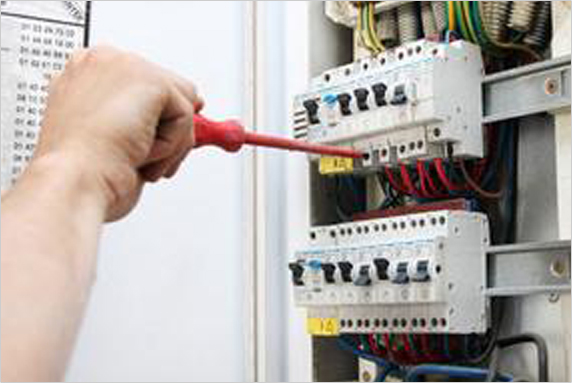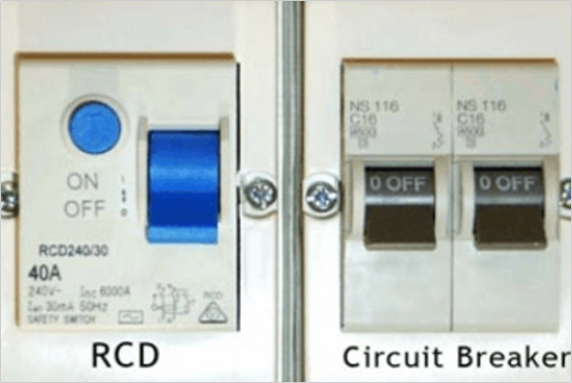RCD Testing
Residual Current Device (RCD) Testing requirement for electrical equipment under AS/NZS 3760:2010 & AS/NZS 3012:2010 standards. On this page you will find
all the information that you need to know to position yourself to ensure that your site is compliant with the appropriate regulations.

What is an RCD ?
A RCD (Residual Current Device) is a safety device that disconnects a circuit when it detects an imbalance of the electric current. The RCD turns the power off almost immediately to prevent electrocution. While you may still receive an electric shock, the duration will be very short, reducing the risk of serious injury.
Where electricity is supplied through a socket, the risk associated with that supply must be minimized by the use of a RCD.
A RCD cannot detect all types of faults, for example if a person receives a shock between the active and neutral conductors. However these circumstances are rare and the vast majority of incidents occur between the active conductor and earth, which is protected by a RCD.
If a person comes in contact with a live electrical conductor, electricity flows through their body, causing an electric shock. Effects can vary from a tingling sensation or muscular pain to breathing difficulties, burns, and heart failure.
RCDs are extremely sensitive, disconnecting within 10 to 50 milliseconds of detecting a leakage current. This is usually lower for domestic residences, but may be lower in other locations such as hospitals. This stops the flow of electricity through someone’s body to earth. Importantly, this response time is much faster than the critical section of the cardiac cycle, and therefore reduces the risk of death or serious injury.
RCDs also protect against fire caused by faults in appliance, tools and wiring. If these faults go undetected they could cause a fire, or personal injury. RCD’s provide a means of early fault detection.
Test Intervals
Construction & Mining – RCD Testing to be carried out to AS/NZS3012:2010
RCD Operating Time (RCD Tester)
Non- Portable -Fixed RCD’s – 12 monthly tests for operating time by
qualified person
Portable RCD’s – 3 monthly tests by qualified person
RCD – Push Button Test (by user)
Non- Portable -Fixed RCD’s – 1 monthly push button test by user
Portable RCDs – To be tested daily, or before connection of electrical
equipment by user
All other workplaces to AS/NZS 3760:2010
RCD Operating Time (RCD Tester)
Non- Portable -Fixed RCDs – 12 monthly tests for operating time by qualified person
Portable RCDs – 3 monthly test by qualified person
RCD – Push Button Test (by user)
Non- Portable -Fixed RCDs – 12 monthly push button test by user
Portable RCDs – To be tested daily or before connection of electrical
equipment by user

”difference
Circuit Breakers and fuses are designed to protect electrical cables and fittings installed in premises from overloading and short circuits. They cut the power when electrical wiring in the premises has too much current flowing through it. They are designed to prevent electrical fires, not electrocution.
Some meter boxes have surge protection fitted to safeguard appliances against a spike in electrical voltage, such as a lightning strike. Some power boards or
extension leads also have surge protectors fitted. These devices do not offer
any protection against electrocution.
Only RCDs will prevent electrocution by cutting the power to a circuit in the event of an earth leakage.
This why you need to ensure that your RCDs are regularly tested.
Why Test RCD ?
The majority of electrical fatalities could have been prevented by the use of a properly installed RCD, and regular testing to ensure they are working correctly.
RCD’s also protect against fire caused by faults in appliance, tools and wiring.
If these faults go undetected they could cause a fire or personal injury.
RCD’s provide a means of early fault detection.
By law most work places have a Residual Current Device (RCD) Testing
requirement for electrical equipment under AS/NZS 3760:2010 & AS/NSZ3012:2010 standards.
Different Types of RCDs
A RCD looks like a circuit breaker, but also has a test button.
The photograph shows two circuit breakers compared with a RCD (note the
test button). Combined RCD/circuit breakers are available also. These devices provide protection from overload, short circuit and electrocution. They also have a test button.
Portable RCDs
Portable RCDs attached to a power board or extension lead are available. RCDs on power boards and extension leads only protect the circuits of appliances connected to them. They are essential for people using power tools or electrical appliances outside that are not protected by a meter box RCD or power point RCD.

